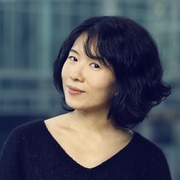 © Philipp Ottendörfer
© Philipp Ottendörfer
Huihui Cheng
Chinese composer born 20 September 1985 in Wu-Chang.
Huihui Cheng was born in 1985 in Wu-Chang, in the province of Hei-Long-Jiang, in Northeastern China. After studying composition with Guoping Jia at the Central Conservatory of Music in Beijing, she went on to specialize in electronic music composition at the Stuttgart University of Music and Performing Arts, studying with Marco Stroppa and Piet Johan Meyer. In 2015, she participated in Cursus (the IRCAM’s composition and computer music course), where she studied composition with Hèctor Parra Esteve.
Between 2016 and 2018, she attended the Academy of the SWR Vocal Ensemble and the Deutsche Bank Stiftung’s Akademie Musiktheater Heute. During this period she held many artistic residencies, notably with the Schöppingen, Baden-Würtenberg, and Schloss Wiepersdorf Foundations in Germany, the Royaumont and Camargo Foundations in France, and the Villa Massimo-Casa Baldi in Italy. More recently, she was awarded a fellowship from the Baden Wüttemberg Art Foundation.
Her compositions have been performed at the Beijing Modern Music Festival, the Berlin Chinese Culture Festival, the Munich Biennale, the Tongyeong International Music Festival in Korea, the Donaueschinger Musiktage “Next Generation,” the Wien Modern Festival, the Eclat Festival in Stuttgart, and Luxemburg’s Rainy Days Festival.
Her interdisciplinary work draws on voice, instrumentation, electronic music, and theater arts. Using visuals, objects, installations, random operations, and electronics, Huihui Cheng plays with the relationship between costume and performance with the goal of expanding the expressive potential of music. In Me Du Ça, the piece for soprano and live electronics she composed for Cursus, the composer created an augmented headpiece for the singer in order to recreate the mythic figure of the Medusa. Messenger,, for piano, also expands on this exploration of different interactions between costuming and instrumentation: the pianist is attached to the piano by cords and strings, creating a “prepared upright piano.”
Huihui Cheng also collaborated on the CoSiMa project with the IRCAM’s Interaction Sound Music Movement (ISMM) team and with the researcher and developer Benjamin Matuszewski on a participative performance concept that makes use of the audience’s smartphones.
Awards and Honors
- Giga-Hertz Production Prize Karlsruhe, 2016
- First Prize at the International Isang Yun Competition, 2011
- First Prize at the China ConTempo Composition Competition, 2007
© Ircam-Centre Pompidou, 2019
Sources
Site de la compositrice ; BabelScores ; Ensemble Télémaque ; Fondation Camargo.
- Solo (excluding voice)
- Messenger for string-piano (prepared upright piano) (2017), between 11 mn and 15 mn, BabelScores
- Chamber music
- elec SEA.M.S for sheng, clarinet, cello, percussion and electronics (2018), between 11 mn and 15 mn, BabelScores
- Instrumental ensemble music
- Aftersound for sheng, guzheng, pipa and ensemble (2005), 8 mn about , Inédit
- Shining for orchestra (2011), between 11 mn and 15 mn, BabelScores
- Kinetic Distance IV for ensemble (2016), between 6 mn and 10 mn, BabelScores
- Vocal music and instrument(s)
- elec stage Tian Wen for two solo vocal ensembles, three instruments and live electronics (2012), between 11 mn and 15 mn, BabelScores
- elec Echo & Narcisuss for soprano, viola, ensemble and live electronics (2018), between 11 mn and 15 mn, BabelScores
- A cappella vocal music
- elec stage Durch die Blume for four voices and multimedia device (2014), between 11 mn and 15 mn, BabelScores
- elec ircam Ircam cursus Me Du Ça for female voice and live electronics (2016), between 6 mn and 10 mn, BabelScores
- What love tells me No.3 for five female voices (2018), between 6 mn and 10 mn, BabelScores
- 2018
- elec Echo & Narcisuss for soprano, viola, ensemble and live electronics, between 11 mn and 15 mn, BabelScores
- elec SEA.M.S for sheng, clarinet, cello, percussion and electronics, between 11 mn and 15 mn, BabelScores
- What love tells me No.3 for five female voices, between 6 mn and 10 mn, BabelScores
- 2017
- Messenger for string-piano (prepared upright piano), between 11 mn and 15 mn, BabelScores
- 2016
- Kinetic Distance IV for ensemble, between 6 mn and 10 mn, BabelScores
- elec ircam Ircam cursus Me Du Ça for female voice and live electronics, between 6 mn and 10 mn, BabelScores
- 2014
- elec stage Durch die Blume for four voices and multimedia device, between 11 mn and 15 mn, BabelScores
- 2012
- elec stage Tian Wen for two solo vocal ensembles, three instruments and live electronics, between 11 mn and 15 mn, BabelScores
- 2011
- Shining for orchestra, between 11 mn and 15 mn, BabelScores
- 2005
- Aftersound for sheng, guzheng, pipa and ensemble, 8 mn about , Inédit
Liens internet
- Site de la compositrice : https://huihuicheng.com/
- BabelScores : https://www.babelscores.com/HuihuiCheng
- YouTube : https://www.youtube.com/user/huihuihuicheng/videos
- Diffusion intégrale de What love tells me et portrait de la compositrice dans Création Mondiale sur France Musique le samedi 16 juin 2018 : https://www.francemusique.fr/emissions/creation-mondiale-l-integrale/what-love-tells-me-de-huihui-cheng-diffusion-integrale-et-portrait-de-la-compositrice-62496
(liens vérifiés en octobre 2019).
Bibliographie
- Martin TCHIBA, « Die Komponistin Huihui Cheng », Neue Zeitschrift für Musik, 2019/4, p. 44-46 (lire l’article en ligne ; lire une traduction de l’article en français ici).
Discographie
- Huihui CHENG, Me du ça ; Narcissus & echo ; Messenger . Calling Sirens ; Your smartest choice ; Your Turn, dans « Deutscher Musikrat - Edition Zeitgenössischemusik », Ensemble Ubu ; Ensemble Mosaik ; Neue Vocalisten ; Ensemble Experimental ; SR Experimentalstudio, 1 Cd Wergo, 2020, WER 64322.
- Huihui CHENG, Aftersound, dans « Young China – Neue Musik Aus Dem Reich Der Mitte », 2 CD hr2 kultur, 2009, hrmn 040-09.